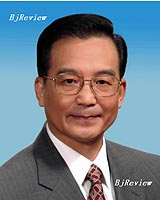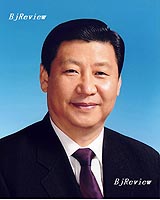|

Wen Jiabao
Premier of the State Council
While helping China to achieve double-digit GDP growth for five consecutive years, he has lived up to his motto, "The most important issue under the sun is to care for the well-being of the people."
Wen Jiabao, the 65-year-old Chinese premier, has gained much popularity since he first took office in March 2003. He was approved by the NPC on March 16 to be premier of the State Council, the Chinese cabinet, for another five-year term.
Throughout his first tenure as premier, Wen stood in the vanguard to confront every disaster, visiting hospitals during the SARS outbreak in 2003, and trekking on slippery roads to oversee relief work when the worst snow and ice storm in 50 years battered central, south and east China earlier this year.
He has visited most of the country's 2,800-odd counties, wearing his homely jacket and sneakers and chatting with farmers, miners and migrant workers.
He once invited about a dozen grain farmers, rural teachers, coal miners, migrant workers and community doctors to Zhongnanhai, the leadership compound, to hear their comments on state affairs and government policies.
Since becoming premier in March 2003, Wen has underscored the well-being of the people, particularly those in the underdeveloped western regions. He has led the government in a strenuous campaign to provide equal education, medical care and other social security coverage for the country's 730 million farmers.
For five years, his government work reports to the annual NPC session were full of inspiring new policies aimed at improving the livelihood of the people, and led to the agricultural tax exemption and direct subsidies to grain farmers.
Wen, whose own parents were teachers, underscored time and again the importance of education, and facilitated the exemption of tuition and miscellaneous fees for primary and middle school students in the rural areas, as well as for students of six leading teachers' universities across the country.
This year, he further promised nine years of free compulsory education in both urban and rural areas.
Trained as a geologist, Wen is cool-headed and steadfast, and confronts the nation's woes with the persistence of an avid prospector, and the precision of a professor.
"It's hard to be premier of the world's most populous nation," Wen said on several occasions. "A trivial issue becomes a big one when multiplied by 1.3 billion, and an astronomical figure becomes minute when divided by 1.3 billion."
In his first tenure as premier, Wen's government led China to become the world's fourth largest economy after the United States, Japan and Germany, blending effective macroeconomic regulation with a newly-installed market economy mechanism.
Born in 1942 in north China's port city Tianjin, Wen worked in northwestern Gansu Province for 14 years before he was moved to the Ministry of Geology and Mineral Resources in Beijing in 1982. Beginning in 1985, he worked for eight years at the General Office of the CPC Central Committee, serving as its deputy director and then director.
Wen became China's youngest vice premier in 1998, overseeing agricultural and rural affairs, economic planning and finance.
He was elected into the Standing Committee of the Political Bureau of the CPC Central Committee in 2002, and was reelected into the nine-member top decision-making body in 2007.
An ideal government, as Wen sees it, should "perform duties in compliance with law, and be open, transparent, practical, efficient, clean and upright." In his government work report to the NPC in 2005, he targeted building "a service-oriented government."

Xi Jinping
Vice President
Xi Jinping, 54, was elected vice president of the People's Republic of China on March 15, five months after he was promoted to the nine-member Standing Committee of the Political Bureau of the Central Committee, the top decision-making body of the ruling party. His predecessor is 68-year-old Zeng Qinghong.
Xi also takes charge of Party affairs and the Party School of the CPC Central Committee, Hong Kong and Macao affairs, and a top-level leading group for the preparations of the Beijing Olympics and Paralymics.
Before coming to Zhongnanhai, the compound of the country's top leaders in downtown Beijing, in October last year, Xi had just reshaped the image of China's financial center of Shanghai as secretary of the city's Party Committee. A social security fund scandal had led to the downfall of the city's former Party chief Chen Liangyu and more than a dozen senior city officials and businessmen.
After seven months of hard work, Xi succeeded in not only maintaining stability in Shanghai but also polishing its tarnished image by bringing fresh blood into the city.
As son of Xi Zhongxun, a Communist revolutionary hero and former Vice Premier, Xi Jinping has, nevertheless, kept a low profile for decades.
He was sent to a remote mountain village in the northwestern province of Shaanxi when he was only 16 years old. He spent six years there, chopping hay, reaping wheat and shepherding in the daytime, and reading books in the dim light of a kerosene lamp while enduring the harassment of fleas at night. He was soon elected the village's Party branch secretary because of his prestige among the local people and enthusiasm for work. He was later recommended for enrollment at Tsinghua University.
After graduation from the Chemical Engineering Department of Tsinghua in 1979, he became secretary of Geng Biao, then Vice Premier and Minister of National Defense. But three years later, he decided to give up the comfortable life in Beijing and go down to the grassroots to be trained.
In the following two decades, Xi started as deputy secretary of the Party Committee in rural Zhengding County in Hebei Province, and gained more and more work experience in the country's affluent coastal areas, including Fujian and Zhejiang provinces and Shanghai.
Xi worked in Fujian for 17 years, being promoted from vice mayor of Xiamen in the mid-1980s to provincial governor in the early 2000s. During his tenure, Xi dedicated himself to building a service-oriented government, conserving the ecological environment and resources, and promoting cooperation with Taiwan across the Taiwan Straits.
Xi moved to Zhejiang in 2002, when the fast growing province was faced with a predicament-the extensive economic growth mode could not support sustainable development.
After thorough study of Zhejiang's actual conditions, Xi concluded that the province must start all over again with overall industrial restructuring. As secretary of the provincial Party Committee, Xi ordered local authorities to shut down or relocate polluting and energy-consuming businesses, and join hands with neighboring Shanghai Municipality and Jiangsu Province to achieve a scientific and sustainable development. Zhejiang has secured its position as one of the wealthiest provinces in China with rapid economic growth.
Xi married Peng Liyuan, a renowned folk song singer in China, in 1987. The couple has a daughter.
(source: www.xinhuanet.com) | 